Call for an expertto represent the consumer interests in Smart grids and Smart meters and standardisation in 2023 ANEC is seeking an expert to provide us with technical expertise, represent our organisation and defend the consumer interests in smart meters standardisation - such as in the CEN-CENELEC-ETSI Coordination Group on Smart Grids (CG-SG). Background:In 2009, the European Commission (EC) and EFTA mandated CEN, CENELEC and ETSI the development of an open architecture for utility meters involving communication protocols enabling interoperability (smart metering). In response to this request M/441 (https://bit.ly/3L9xOaL) CEN, CENELEC and ETSI decided to combine their expertise and resources by establishing the Coordination Group on Smart Meters (CG-SM). In March 2011, the European Commission and EFTA issued the Smart Grid Mandate M/490 (https://bit.ly/3GSdPfa) requesting CEN, CENELEC and ETSI to develop a framework to enable ESOs to perform continuous standard enhancement and development in the smart grid field. In order to perform the requested work, the ESOs combined their strategic approach and established the Coordination Group on Smart Energy Grids (CG-SEG). In January 2021, taking into consideration the close contact between both Groups since the beginning of its creation when the European Commission issued the mandates M/441 (utility meters) and M/490 (smart grid), CEN and CENELEC BTs and ETSI Board decided to merge both groups. Scope: The CG-SG advises on European standardization requirements relating to smart electrical grid and multi-commodity smart metering standardization, including interactions between commodity systems (e.g. electricity, gas, heat, water), and assesses ways to address them. This includes interactions with end-users, including consumers/prosumers. Its aim is to promote the deployment of open and interoperable data architectures, based on European and international standards. The scope also includes any standards needed to design, operate and maintain electrical grids securely and efficiently. In the specific area of metering, its scope includes electricity, water, gas and heat/cooling metering devices and systems, and associated architectures. Within its scope the Group addresses the European requirements resulting from the Clean Energy Package, including secondary legislation, and any other relevant Commission initiatives. The CG-SG also receive inputs from and provide input to the European Commission’s activities related to standardization in the field of smart grids and meters. With respect to international standardization activities on smart grids and meters, the Group monitors the progress of the relevant standardization activities in ISO, IEC and ITU, and promote coordination between the European activities and those at the international leveland promote when needed the consideration of European requirements within international standardization. The Smart Grids CG has also just created a sub-group on Smart Meters, that ANEC will join. We would like the new ANEC representative to also become a member of the Smart Meters sub-group. The current ANEC representative attended a setting-up meeting this week, that discussed the Terms of Reference for reporting back to the Plenary. CEN-CENELEC-ETSI Coordination Group on Smart Grids, including the sub-group on Smart Meters will have about 2 meetings per year. In our work, we highlight the potential impacts of smart energy systems on consumers and stress key consumer issues that should be taken into account in the changing energy environment. Several areas of consumer relevance that we believe remain to be tackled relate to personal data protection and security issues and accessibility/usability of in-home displays as well as the provision of information to the consumer via in-home displays. Furthermore, ANEC participates in the European Commission Task Force on Smart Grids (SGTF) [soon to be renamed as ‘Smart Energy Expert Group’]. The current Task Force is meant to advise on policy and regulatory directions at European level and coordinate steps towards the implementation of smart grids and roll out of smart meters across Europe under the Third Energy Package. The Task Force is formed of a Steering Committee and three Expert Groups, jointly developing a common vision for this implementation process and identifying regulatory recommendations and key issues to be resolved. ANEC has been actively involved in the European Commission Smart Grid Task Force Expert Group 1 (EG1) on Standards and Interoperability, tasked to help the EC with expert knowledge in preparing the development of implementing acts on data interoperability. ANEC monitors SGTF Expert Group 2 (EG2) on Cybersecurity. The group deals with privacy and data protection in smart grids. ANEC also monitors SGTF Expert Group 3 (EG3) on Demand response, tasked to identify success stories and best regulatory practices, including remaining legislative gaps and propose scopes for further actions. ANEC is the European consumer voice in standardisation, is open to members from 34 European countries. It defends consumer interests in standardisation and the use of standards, and in the development of related legislation. More information at (www.anec.eu). Profile: Proven technical expertise in smart meters, focus on digitalization and energy aspects; Potentially understanding of a smart grid; Interest in consumer affairs; Strong communication and analytical skills; Proficiency in English as a working language; Willing to travel (expenses reimbursed and daily allowance payable); No conflict of interest between the role as an ANEC Representative and other responsibilities or work undertaken. The tasks of the expert include: to participate in and present ANEC’s views in the meetings of CEN-CENELEC-ETSI Coordination Group on Smart Grids (online or hybrid meetings); to potentially participate in the work of EC SGTF EG1 on standards and interoperability and monitor the work on EC SGTF EG3 on consumers’ flexibility; report back to the Digital Society WG (two meetings per year); to draft technical comments and provide input into position papers; Although we are unable to offer a salary, we do offer a daily allowance (maximum 95€ per day) and reimbursement of travel, accommodation, subsistence and connection expenses in line with the rules laid down by the European Commission and EFTA Secretariat. Above all, we offer the possibility to our experts to influence legislation and technical standards to the benefit of all those in society. Our reimbursement terms and conditions are available on request. We would be grateful if you could let us know of your interest by 30 April. Also, if you’d have any questions please let us know. |
Horizontal
ANEC welcomes EP Single Market report on standardisation
At the end of March 2023, ANEC was pleased to see that our call for more consumer and civil society participation in standardisation had been heard by the Internal Market and Consumer Protection Committee (IMCO) of the European Parliament (EP). It adopted an own-initiative report on a standardisation strategy for the Single Market which underlines that consumers must be included in the standards affecting their rights, such as on safety and privacy.
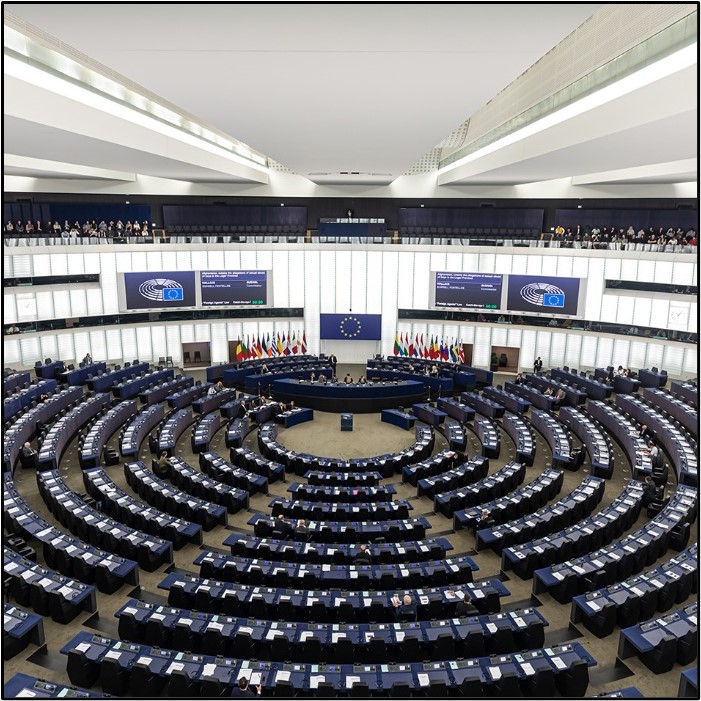
The report can be found at https://bit.ly/3nCzmC5.
World Consumer Rights Day 2023
To mark the occasion of World Consumer Rights Day on 15 March, we joined the social media campaign ‘How can standards help protect consumers through clean energy transitions in the midst of cost-of-living crisis?’, led by our sister organisation, Consumers International (CI).
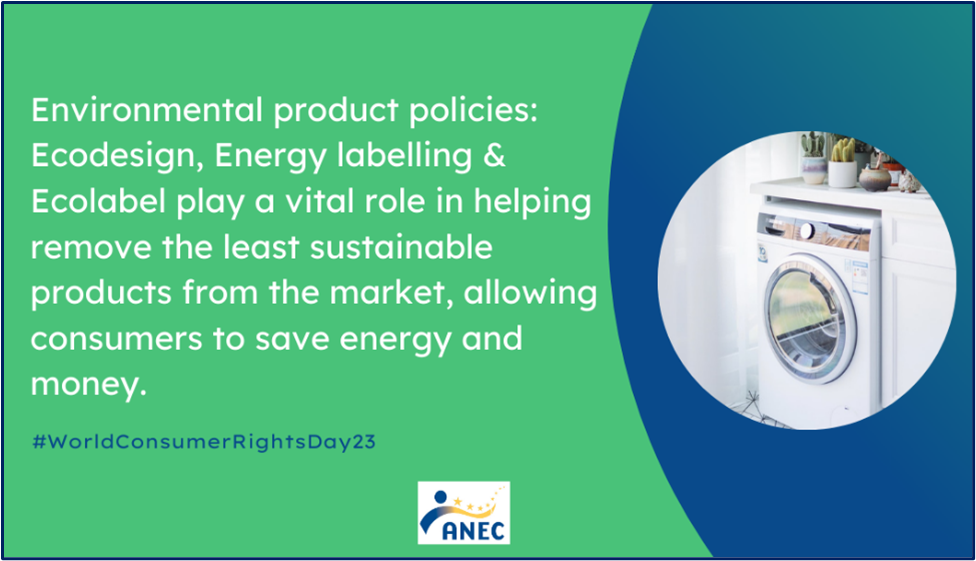
We focused on revision of key pieces of legislation e.g. the Energy Performance of Buildings Directive; European standards supporting implementation of Ecodesign and Energy Labelling criteria; as well as standards supporting consumer vulnerability in time of cost of living crisis.
Simultaneously, we also took part in a joint social media campaign with CEN and CENELEC, where we highlighted our work on the sustainability standard for washing machines.
Child Safety
ANEC Child Safety WG meets
The annual meeting of the ANEC Child Safety Working Group was held in Brussels on 21 and 22 March and attended by 19 experts. It was the first face-to-face meeting of the WG since the pandemic, and the first ANEC WG meeting in the new ANEC offices. We were especially pleased to welcome new experts from the Netherlands and Portugal.
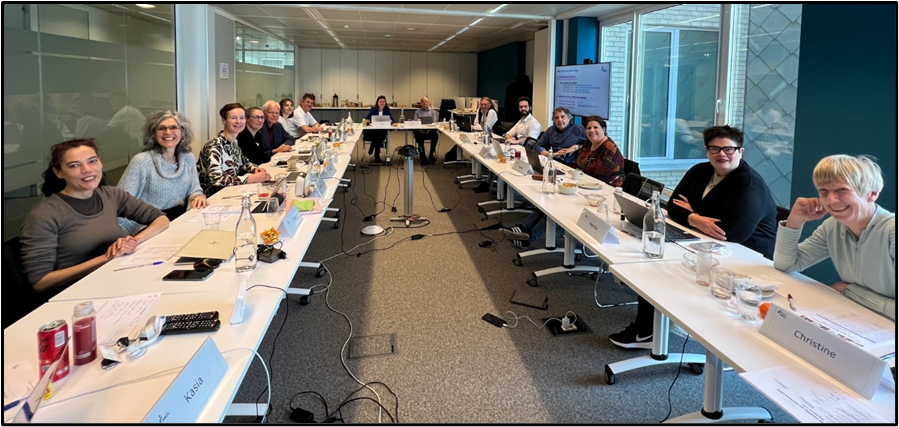
Our experts discussed achievements, upcoming challenges and priorities in standardisation work on toys, sports & playground equipment, childcare articles & children’s furniture, and other products related to child safety.
More detailed discussions were held on the systematic review of the playground equipment standards - EN 1176 Parts 1, 2, 3, 4 and 6 – and imminent formal vote on FprEN 1176-10 ‘Fully enclosed play equipment’. Potential standards work on zip lines was also discussed as well as our involvement in the WGs of ISO TC 310 ‘Child care articles’, inflatable activity toys, toy trampolines, and on the safety of hoods on children’s clothing.
The meeting also considered topics of horizontal nature, such as the change of CEN/CENELEC rules on Technical Reports; safe sleeping conditions for young children; and digital product information. The WG was also took note of revision of the General Product Safety Directive into the General Product Safety Regulation, and revision of the Toy Safety Directive.
Child Safety & Chemicals
Proposed restrictions on CMRs
The EC has asked the European Chemicals Agency (ECHA) to examine the possible presence in child care articles (CCA) of substances classified as carcinogen, germ cell mutagen or reproductive toxicant (CMR) 1A or 1B in Annex VI to the Classification, Labelling & Packaging (CLP) Regulation (EC) No 1272/2008. A call for evidence ran for six weeks, from 15 February 2023 until 31 March.
Following consultation of our members, ANEC and BEUC submitted a joint reply to the call for evidence in March.
We welcomed the opportunity to provide input in support of the planned REACH restriction on CMR substances in CCA, as children are particularly sensitive to hazardous chemicals. We reiterated our strong support for the commitment outlined in the Chemicals Strategy for Sustainability to ensure the safety of children from hazardous chemicals in CCA and other products for children at the same level of protection as for toys.

It is expected that the upcoming revision of the Toy Safety Directive (TSD) will set a generic limit for CMR substances at a level lower than the relevant CLP concentrations and to extend the generic prohibition on CMR substances to additional chemicals of high concern, such as endocrine disruptors for human health (categories 1 & 2). We therefore encourage ECHA and the EC to anticipate a revised TSD approach with regard to lower generic concentration limits for CMR substances when preparing the restriction for CCA, rather than rely on the relevant CLP concentration limits. We stress this as the latter are recognised as providing insufficient protection of children’s health. Likewise, we asked the EC to revisit a future CCA restriction once the REACH revision is finalised to ensure endocrine disruptors are also covered.
In answer to the call for evidence, ANEC and BEUC provided specific contributions from our members’ testing for the presence of CMR substances in textile, foam, plastic & rubber parts of the following articles: seating and related articles specific for eating; transport & travel articles (e.g. baby carriers, car seats, prams, pushchairs, buggies); articles related to eating and drinking (e.g. drinking bottles, sipping cups); teething-related articles, and sleeping insulation.
Accessibility
ANEC comments on Draft SReq on lifts
ANEC welcomes the draft standardisation request (SReq) in support of Directive 2014/33/EU on lifts and safety components for lifts which is out for public consultation. We welcome in particular the required standards on the safety and accessibility of lifts for all consumers also aim at revising existing standards to reflect the latest-state-of-the-art.
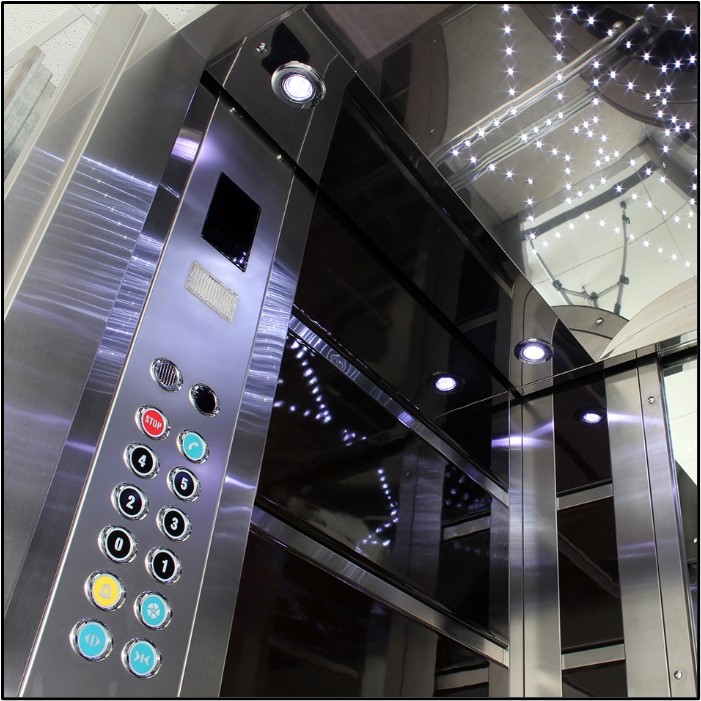
We are pleased the “Requested Harmonised Standard shall take into account usability and accessibility in line with the United Nations Convention on the Rights of Persons with Disabilities”. We refer to existing accessibility obligations contained in the Public Procurement Directives as well as EU Funds. Member States are encouraged to mainstream accessibility funding under the Recovery and Resilience Plans. We would like to stress that there are accessibility obligations that need to be respected and which concern the access to the built environment and lifts. In this context, we think that one Harmonised Standard for passenger and goods lift including all safety and accessibility requirements (merging EN 81-20 and EN 81-70) should be developed. This harmonised standard would lead to a much clearer situation on the market concerning accessibility of lifts in all buildings for public use.
ANEC at EU Consumer Summit 2023
ANEC was delighted to discuss the skills are needed to reduce consumer vulnerabilities at the EU Consumer Summit on 28 March 2023 in Brussels. We shared our experience in product safety standards. Regrettably, the standards developed to support European product safety tend to focus on mainstream consumers and do not always cover the needs of all consumers, so putting them in vulnerable situations.

Warnings and labelling can only complement product safety by design and not substitute it. This is in line with the EU product safety legislation obligations for manufacturers to put only safe products on the market. The development of new technologies allows standards-makers to meet the safety needs of vulnerable consumers better, implementing “safety for foreseeable and reasonable use” in a meaningful way.
Domestic Appliances
ANEC comments on Draft SReq on gas appliances
ANEC welcomed the February 2023 version of the draft Standardisation Request (SReq) in support of the Gas Appliances Regulation (2016/426/EU). The draft addresses several of ANEC’s previous concerns and proposals, especially on the dangers of carbon monoxide (CO) and on the need to limit surface temperatures.
The draft recognises that ‘Carbon monoxide poisoning can occur suddenly even causing death but exposure to low concentrations over a long period of time has also negative health effects’. In relation to the prevention of release of combustion products, “… all harmonised standards for appliances shall be revised in order to take into account the more stringent essential health and safety requirement 3.4.4 regarding the release of combustion products, in particular of carbon monoxide, into spaces, rooms or ambient air”, which we welcome. ANEC suggested to add that data from the World Health Organisation (WHO) on safe levels of CO exposure should be consulted and implemented when revising the standards.
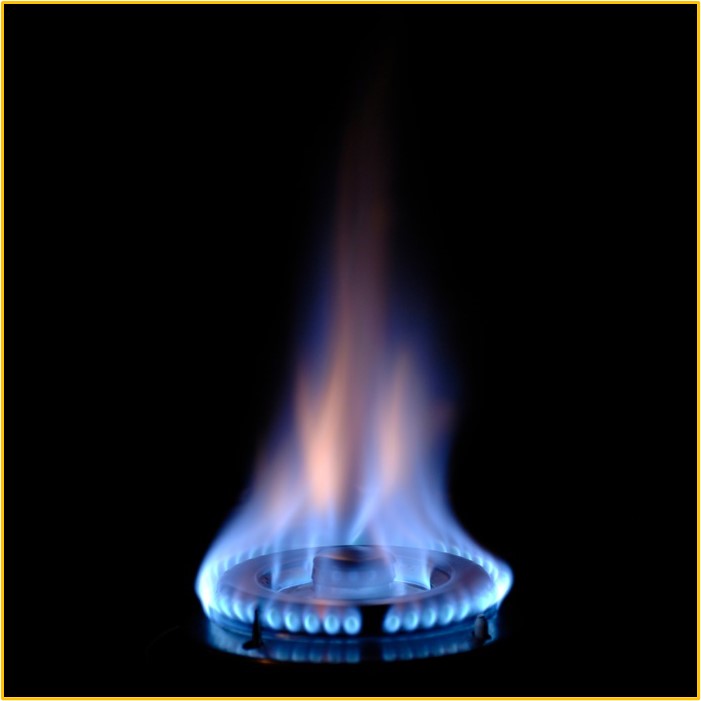
In relation to surface temperatures, the draft SReq indicates that “All harmonised standards covering appliances involving external parts with surface temperatures potentially high enough to endanger the safety of persons exposed shall therefore be revised duly taking account EN ISO 13732-1:2008 to adopt adequate technical specifications to protect users and people exposed, especially children and elderly people“, recognising the slower reaction time of vulnerable consumers when touching hot surfaces.
Sustainability
ANEC on proposed Green Claims Directive
On 22 March, the EC adopted a proposal for a Green Claims Directive (https://bit.ly/40hGf9f).
The proposal exclusively addresses explicit statements made voluntarily by companies on behalf of customers that relate to a product's environmental performance, aspect, or impact, and use a "life-cycle" perspective from raw materials through end-of-life.
ANEC welcomes that the proposal considers the concerns raised over the years by ANEC and others on shortcomings of the Product Environmental Footprint (PEF), and we endorse the choice not to put it forward as the sole instrument to substantiate green claims.
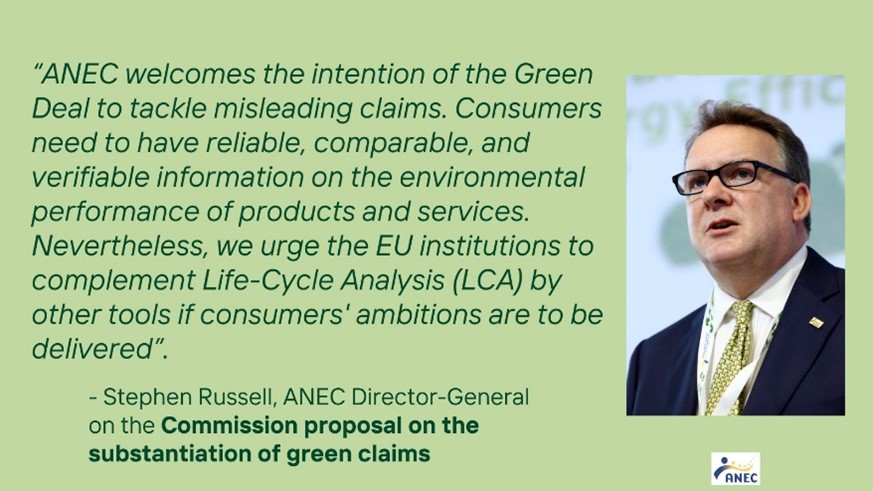
We also welcome the following aspects:
- National regulators, required to constantly monitor green claims, publicly report their results, and sanction businesses that deceive customers, will also be required to impose penalties.
- Labels with aggregated scores will no longer be allowed (unless supporting other labels under EU law).
On the other hand, improvements are required especially regarding:
- The flexibility permitted to companies on the substantiation method used, despite the good news that the use of the PEF method is optional.
- Until a possible revision of the directive, the use of environmental claims for products containing hazardous substances is still allowed.
ANEC recommends providing a choice to identify the right methods for the relevant environmental aspects, along with common rules for the substantiation, communication, and verification of green claims. Reference to the ISO 14020 standards series could support this.
Ahead of the publication of the proposal, we issued a media release (https://bit.ly/41iPmIj) anticipating our expectations from the proposal. We shall react to the proposal in more detail through an updated position paper developed by ANEC Sustainability WG.
Digital Society
ANEC comments on Draft SReq on AI
In parallel to the legislative negotiations on the AI Act, the EC published a draft SReq for European Standards in support of safe and trustworthy artificial intelligence in June 2022 and a revision of the SReq in December. The European Standards are foreseen to be transformed into Harmonised Standards once the AI Act is approved.

After having consulted our members and holding two webinars for civil society on the topic, we sent comments to the EC. These were partially taken into account in the December 2022 version, and tried to influence the position of CEN-CENELEC as the addresses of the SReq.
The final draft SReq was sent to the Member States in the Committee on Standards at the start of April. ANEC noted the wording of the text on inclusiveness, which had reflected our previous comments on the issue, had been weakened. This is of concern given the intention for AI standards to consider fundamental rights. We therefore underlined our plea to ensure inclusiveness of the process in the execution of the AI SReq.
ANEC Digital Society WG
The 41st ANEC Digital Society WG meeting took place virtually on 1 March 2023. The EU Standardisation Strategy, and amendment of Regulation (EU) 1025/2012, were discussed, as well as the 2023 Annual Union Work Programme and Rolling Plan for ICT Standardisation, and the future of the ICT Multi-Stakeholder Platform.

Among other topics, the meeting considered common chargers (through amendment of the Radio Equipment Directive); Smart and sustainable cities and communities; eRecognition and Biometrics. Experts also exchanged views with the Chair of CEN-CLC JTC 21 on AI, Sebastian Hallensleben, on the role of standards in trustworthy AI.
Webinar with DIN on consumer cybersecurity
On 4 April, ANEC and DIN Consumer Council (DIN-VR) held a webinar to present a study commissioned by the Consumer Council on "Consumer security knowledge and behaviour in the digital space: how can standards raise the bar of cybersecurity and resilience?" (https://bit.ly/3L9UDw4).

The survey researched consumer knowledge and behaviour with regard to online security, as well as requirements and wishes for further development of framework conditions and the supporting measures, such as standards.
Participants discussed the recommendations on the role of standards in ensuring that the level of protection foreseen by the Cyber Resilience Act (CRA) is upheld.
Services
ANEC Services WG will meet on 26 & 27 April 2023
The annual meeting of the ANEC Services WG was held in Brussels on 26 & 27 April 2023.
Experts discussed activities on horizontal and inclusive services, fire safety, citizen security and disaster management, as well as tourism and postal services.

On the second day, we were joined by a BEUC colleague who presented the latest news on the Digital Fairness Act. Discussions focused on our work in standards for e-commerce and sharing economy; and healthcare-related standards. DG SANTE updated experts with regard to the implementation of actions following the evaluation report on application of the directive on Patient Rights in Cross-Border Healthcare which was published last year.
News from ANEC member countries
Denmark
Colleagues in the Danish Consumer Council Think Chemicals have discovered PFAS chemicals (per-and polyfluoroalkyl substances) in the lubes used for bike chains. These chemicals can cause health problems after accumulating in the body over several years. They also pose risk to the environment. Of those lubes with dirt and water repellent properties, 12 were found to contain PFAS. PFAS - in the form of PTFE or Teflon – are added in chain lubes to reduce friction. Fluorinated substances in bike oils are also problematic because they can be released to the environment during production and when they are used in chain oils. You can also find PTFE in some dental flosses, non-stick pans etc. More information on Taenk.dk (https://bit.ly/41GUS7m) website.
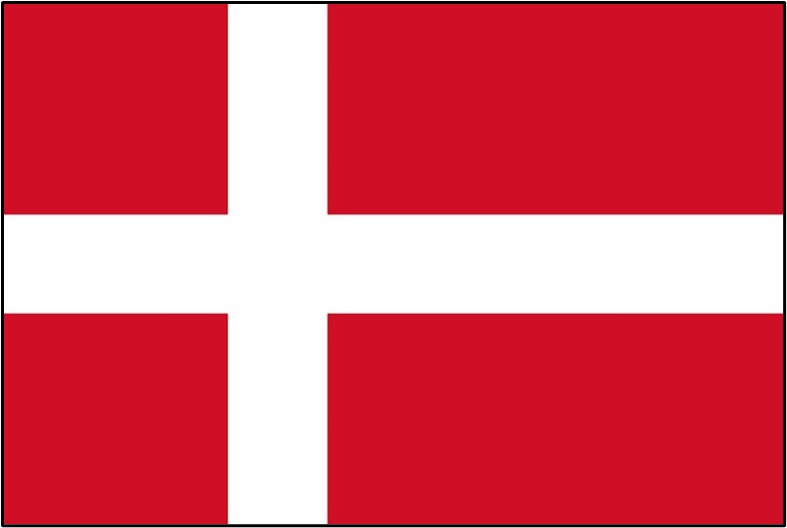
Use of some water-repellent sprays can cause added exposure to unwanted chemicals due to inhalation. Avoid sprays that contain PFAS to make jackets, sofas or boots more water and dirt repellent. More information can be found at https://bit.ly/3GRlcUf.
| List of meetings 2023 |
For comments or if you wish to write an article for the ANEC Newsletter, please contact: Helena CLARK (This email address is being protected from spambots. You need JavaScript enabled to view it.).


